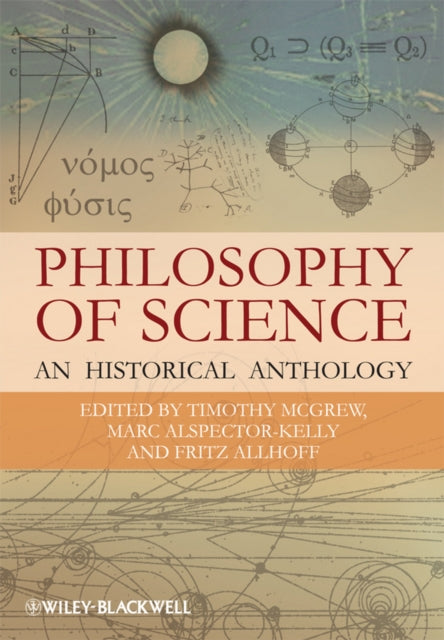Podrobnosti o izdelku
Poglej vseISBN
9781405175425Mladinska knjiga ID
380359Leto izida
2009Datum izida
20.02.2009Velikost (šxdxv)
150 × 200 × 10Status dobavljivosti
7-10 delovnih dniJezik
ANGTeža
300 gZaložnik
JOHN WILEY & SONS LTDAvtor
ALLHOFFOpis
An Historical AnthologyAn anthology that teaches introductory history and philosophy of science courses by means of primary sources from the Greeks to the twentieth century.By combining excerpts from key historical writings with commentary by experts, "Philosophy of Science: An Historical Anthology" provides a comprehensive history of the philosophy of science from ancient to modern times. This book provides a comprehensive history of the philosophy of science, from antiquity up to the 20th century. It includes extensive commentary by scholars putting the selected writings in historical context and pointing out their interconnections. It covers areas rarely seen in philosophy of science texts, including the philosophical dimensions of biology, chemistry, and geology and is designed to be accessible to both undergraduates and graduate students.List of Figures Notes on Editors Personal Acknowledgments Text Acknowledgments Part I Introduction Unit 1 The Ancient and Medieval Periods 1.1 Atoms and Empty Space: Diogenes Laertius 1.2 Letter to Herodotus: Epicurus 1.3 The Paradoxes of Motion: Zeno 1.4 Plato's Cosmology: Plato 1.5 The Structure and Motion of the Heavenly Spheres: Aristotle 1.6 Change, Natures, and Causes: Aristotle 1.7 Scientific Inference and the Knowledge of Essential Natures: Aristotle 1.8 The Cosmos and the Shape and Size of the Earth: Aristotle 1.9 The Divisions of Nature and the Divisions of Knowledge: Aristotle 1.10 On Methods of Inference: Philodemus 1.11 The Explanatory Power of Atomism: Lucretius 1.12 The Earth: Its Size, Shape, and Immobility: Claudius Ptolemy 1.13 The Weaknesses of Hypotheses: Proclus 1.14 Projectile Motion: John Philoponus 1.15 Free Fall: John Philoponus 1.16 Against the Reality of Epicycles and Eccentrics: Moses Maimonides 1.17 Impetus and its Applications: Jean Buridan 1.18 The Possibility of a Rotating Earth: Nicole Oresme Unit 2 The Scientific Revolution 2.1 The Nature and Grounds of the Copernican System: Georg Joachim Rheticus 2.2 The Unsigned Letter: Andreas Osiander 2.3 The Motion of the Earth: Nicholas Copernicus 2.4 The New Star: Tycho Brahe 2.5 A Man Ahead of His Time: Johannes Kepler 2.6 On Arguments about a Moving Earth: Johannes Kepler 2.7 Eight Minutes of Arc: Johannes Kepler 2.8 Tradition and Experience: Galileo Galilei 2.9 A Moving Earth Is More Probable Than the Alternative: Galileo Galilei 2.10 The Ship and the Tower: Galileo Galilei 2.11 The Copernican View Vindicated: Galileo Galilei 2.12 The "Corpuscular" Philosophy: Robert Boyle 2.13 Successful Hypotheses and High Probability: Christiaan Huygens 2.14 Inductive Methodology: Isaac Newton 2.15 Space, Time, and the Elements of Physics: Isaac Newton 2.16 Four Rules of Reasoning: Isaac Newton 2.17 General Scholium: Isaac Newton 2.18 The System of the World: Isaac Newton Unit 3 The Modern Period 3.1 The Inductive Method: Francis Bacon 3.2 Rules for the Discovery of Scientific Truth: Rene Descartes 3.3 Rationalism and Scientific Method: Rene Descartes 3.4 Human Knowledge: Its Scope and Limits: John Locke 3.5 The Principle of Least Action: Gottfried Wilhelm Leibniz 3.6 Space, Time, and Symmetry: Gottfried Wilhelm Leibniz 3.7 The Problem of Induction: David Hume 3.8 The Nature of Cause and Effect: David Hume 3.9 The Metaphysical Foundations of Natural Science: Immanuel Kant Unit 4 Nineteenth and Early Twentieth Century 4.1 The Nature of Scientific Explanation: Antoine Lavoisier 4.2 Determinism, Ignorance, and Probability: Pierre-Simon Laplace 4.3 Hypotheses, Data, and Crucial Experiments: John Herschel 4.4 An Empiricist Account of Scientific Discovery: John Stuart Mill 4.5 Against Pure Empiricism: William Whewell 4.6 The Causes Behind the Phenomena: William Whewell 4.7 Catastrophist Geology: Georges Cuvier 4.8 Uniformitarian Geology: Charles Lyell 4.9 The Explanatory Scope of the Evolutionary Hypothesis: Charles Darwin 4.10 Induction as a Self-Correcting Process: Charles Sanders Peirce 4.11 The Nature of Abduction: Charles Sanders Peirce 4.12 The Role of Hypotheses in Physical Theory: Henri Poincare 4.13 Against Crucial Experiments: Pierre Duhem 4.14 On the Method of Theoretical Physics: Albert Einstein Part II Introduction Unit 5 Positivism and the Received View 5.1 Theory and Observation: Rudolf Carnap 5.2 Scientific Explanation: Carl Hempel 5.3 Empiricism, Semantics, and Ontology: Rudolf Carnap 5.4 The Pragmatic Vindication of Induction: Hans Reichenbach 5.5 Dissolving the Problem of Induction: Peter Strawson Unit 6 After the Received View: Confirmation and Observation 6.1 Empiricist Criteria of Cognitive Significance: Problems and Changes: Carl Hempel 6.2 The Raven Paradox: Carl Hempel 6.3 Two Dogmas of Empiricism: W. V. O. Quine 6.4 The New Riddle of Induction: Nelson Goodman 6.5 What Theories Are Not: Hilary Putnam 6.6 On Observation: N. R. Hanson 6.7 The Ontological Status of Theoretical Entities: Grover Maxwell Unit 7 After the Received View: Methodology 7.1 Science: Conjectures and Refutations: Karl Popper 7.2 The Structure of Scientific Revolutions: Thomas Kuhn 7.3 Science and Pseudoscience: Imre Lakatos Unit 8 After the Received View: Explanation 8.1 Counterexamples to the D-N and I-S Models of Explanation: Wesley Salmon 8.2 The Statistical Relevance Model of Explanation: Wesley Salmon 8.3 Why Ask, "Why"?: Wesley Salmon 8.4 Explanatory Unification: Philip Kitcher Unit 9 After the Received View: The Realism Debate 9.1 The Current Status of Scientific Realism: Richard N. Boyd 9.2 A Confutation of Convergent Realism: Larry Laudan 9.3 Constructive Empiricism: Bas van Fraassen 9.4 The Natural Ontological Attitude: Arthur Fine
Pogosto kupljeno skupaj
Prikaži vse podrobnosti

Mehka
Ostali so si ogledali tudi ...


Več kot pol milijona knjig
Največja ponudba slovenskih in tujih knjig na enem mestu.

Enostaven nakup
Do izbranega le z nekaj kliki na spletu ali v eni od več kot 50 knjigarn.
Strokoven nasvet
Pred nakupom nas pokličite za nasvet ali se oglasite v knjigarni.

Vse za šolo
Nagrajena izobraževalna gradiva in kakovostne potrebščine.

Celovita ponudba za dom in pisarno
Vrhunski izdelki priznanih blagovnih znamk.
Brezplačna dostava
Brezplačna dostava za vsa naročila nad 59 € (za šolske pakete nad 140 €)
Knjigarne
Zaloga
×Osveženo 26.03.2023 10:09
Slovenska cesta 29, 1000 Ljubljana
E-naslovSpletna knjigarna: info@emka.si, Mladinska knjiga Založba: info@mladinska-knjiga.si
Kontakt01 241 30 00
Brezplačna številka080 12 05
Prijava na e-novice
© 2025 Mladinska knjiga. Vse pravice pridržane.
- Ko izberete elemente, se celotna stran osveži.
- Odpre se v novem oknu.

















